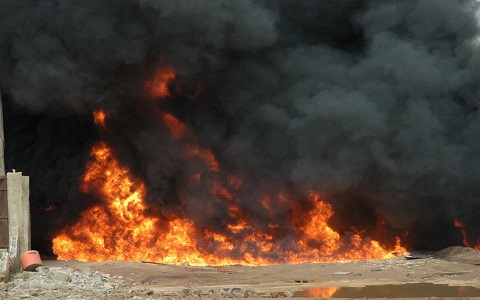

Fire outbreaks have remained a major disaster wreaking unqualifiable havoc on lives and property globally.
It is most prevalent from November to March every year with infernos in markets, places, factories, homes and schools.
This is due to the change in weather, usually referred to as harmattan period which influences the proneness of many areas to fire, as the dry wind tends to increase the severity of combustion.
Report shows that most fire outbreaks during this season are caused by careless handling of highly inflammable materials by people.
Other causes of fire outbreaks include unsupervised use of fire crackers by children, bush burning especially in agrarian communities, as dry wind blows the fire out of control, spreading it to settlements.
Also, lack of up to date facilities in the fire service stations across the country had made it difficult to combat infernos.
To combat fire incidences in the country, the federal government in 2013 approved the National Fire Safety Code.
The National Fire Safety Code contained what should be done by property owners before, during and after construction of property in order to quickly curb the spread of fire during outbreak.
The code spells out, among other things, what should be considered when planning commercial, residential or other type of building, so that fire outbreaks can quickly be brought under control if they happen.
Sadly, six years after the implementation of the code, not much expected changes have taken place rather the situation has gone from fry pan to fire as evidence in reports.
For instance, the Lagos state fire services recorded over one hundred fire incidents across the state from January till date.
The dead were not spared by fire outbreaks, as twelve corpses were burnt when the morgue of the anatomy department of the department of the Obafemi Awolowo University went up in flames.
Similarly, Kano state fire service recorded a total number of six hundred and sixty five outbreaks in the state same year, with about one hundred and twenty three lives lost.
Experts have blamed this occurrences on factors like increase in population and urbanisation with no commensurate improvement and expansion in public infrastructure, poor safety culture as well as wide gap in skills, knowledge and security risk.
They noted that though the fire safety code exist, not many are familiar with the provision of the code which had made the country continued to wallow in huge human and material avoidable loss.
The experts emphasised that government at various levels have not effectively operated the fire safety code while enforcement officials mostly spring to action when disaster erupted.
To stem the tide of fire outbreaks during harmattan, there must be increase awareness by relevant agencies on the activities that can lead to fire outbreaks.
People should check indiscriminate refuse and bush burning as well as avoid storage of petroleum products.
The same vein, people should avoid overloading electrical sockets or outlets with a lot of appliances at the same time to prevent sparks that may lead to fire.
Government on its part should ensure enforcement of the fire service code through relevant agencies.
Provision of up to date facilities in the nation’s fire service stations should be made a priority by government at all levels for effectiveness.
While routine training of fire fighters on comprehensive fire emergency procedures be looked into.
Titilayo Kupoliyi